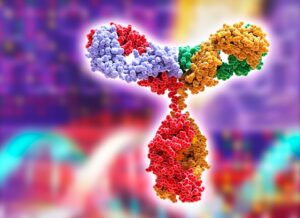Approximately 10% of COVID-19 cases lead to severe respiratory distress and hospitalization. In an effort to develop specific therapeutic options for COVID-19, bamlanivimab was derived from convalescent plasma from a patient with COVID-19. Bamlanivimab, a neutralizing monoclonal antibody with high affinity for the spike protein of SARS-CoV-2, blocks viral attachment and entry into human cells. Based on interim results from a phase 2, single-dose, randomized clinical trial in 452 non-hospitalized patients (80% with mild symptoms at randomization), bamlanivimab decreased the viral load and risk of hospitalization. Patients were infused with bamlanivimab at a median time of four days after developing symptoms. Almost all patients cleared the virus by day 11, but patients who received bamlanivimab were less likely to be hospitalized compared to those who received placebo (1.6% in the bamlanivimab group compared to 6.3% in the placebo group). This trend was more pronounced among individuals aged ³65 years or a body-mass index (BMI) of >35. Based on these results, the U.S. FDA granted emergency use authorization (EUA) for bamlanivimab for non-hospitalized adult and pediatric patients with confirmed COVID-19. Further research is needed to determine the optimal dosage of bamlanivimab.
References:

